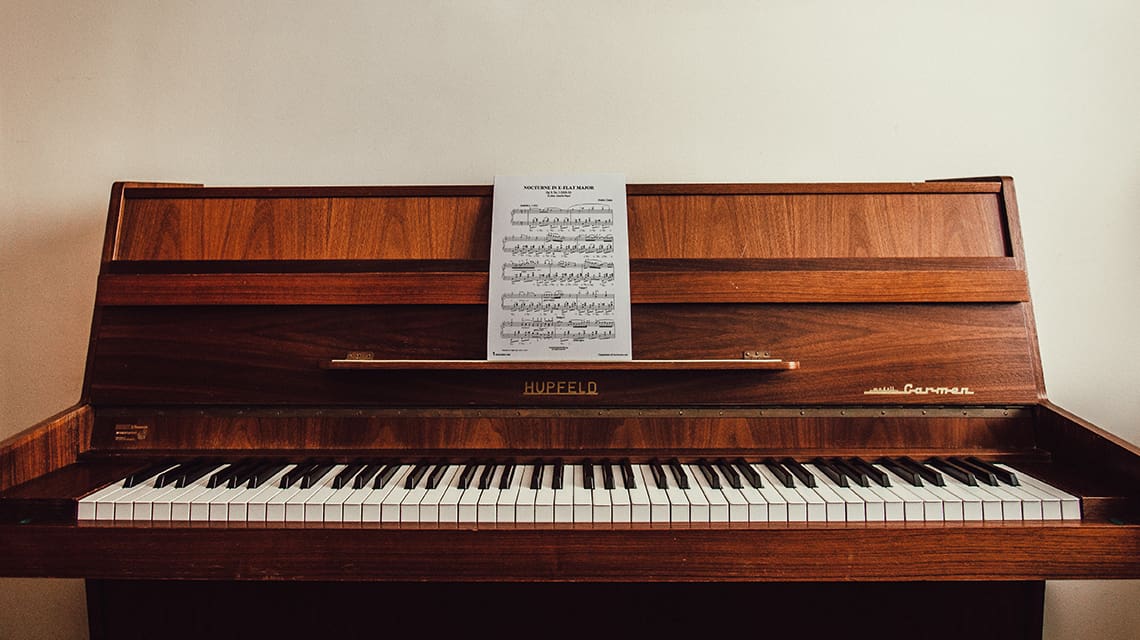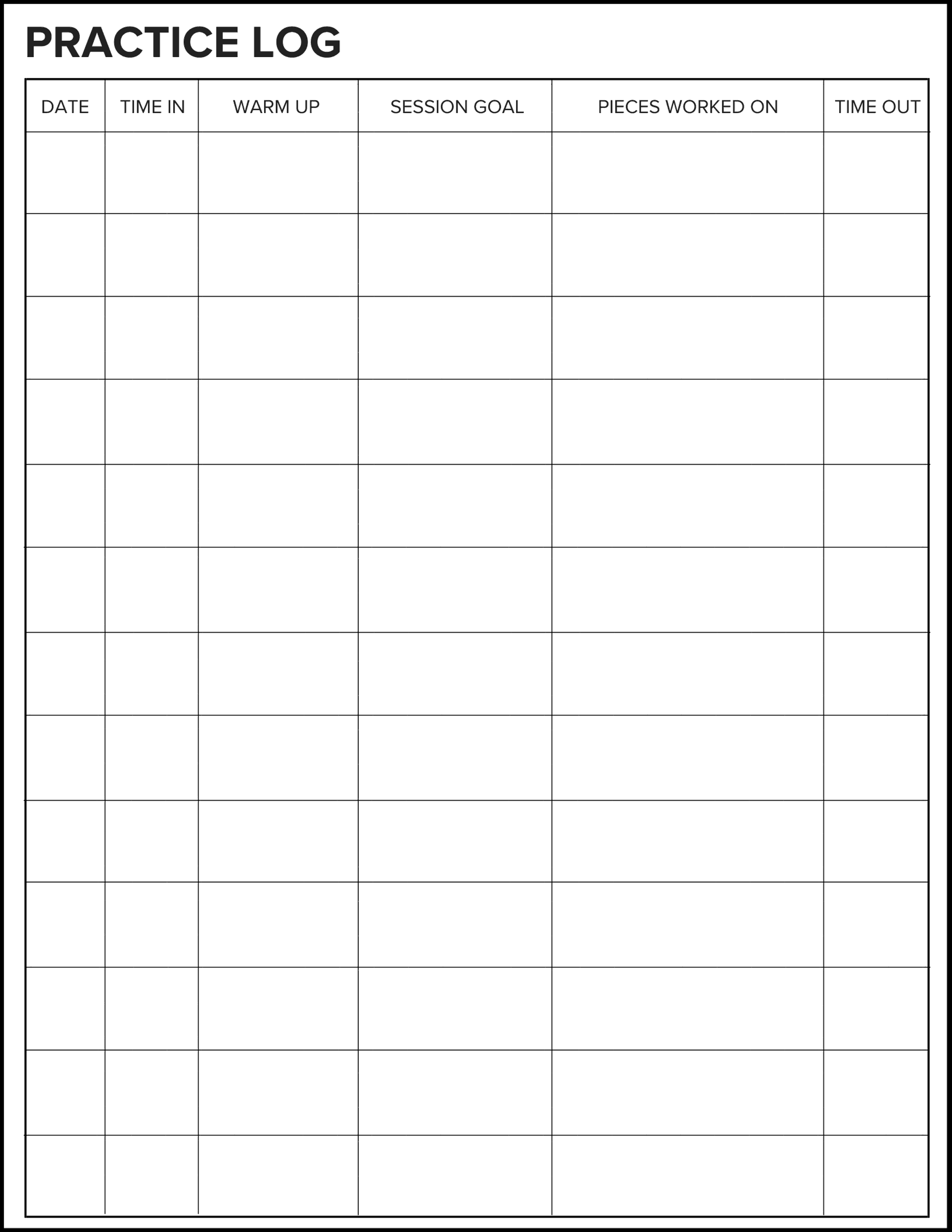Maximize Your Time with These 10 Music Practice Tips
These music practice tips will help you maximize your time and set you up for more efficient sessions. Practice can be overwhelming, so we’re here to help!

Every great musician will tell you that countless hours go into practicing and honing their craft. But they’ll also admit that there are many times that they don’t feel like practicing. We’ve all been there, but it’s important to push through in order to keep moving forward. In order to make practicing your instrument more enjoyable and more effective, you’ll need to be able to manage your time well. So we’re going to give you ten tips that will help you maximize your practice time and break through those tough days!
1. Set Your Environment
There isn’t one type of environment that works for everyone, so when it comes to picking your practice environment, find what works for you. You might prefer to practice in the comfort of your own room, or you may feel more motivated having a designated “practice room.” Wherever you end up, make sure that you won’t be easily distracted or interrupted. Your goal should be to stay focused during your practice time, so find an environment that is comfortable enough to stay in until you’re finished.

2. Have a Focused Objective
It’s important to go into your practice session with an end goal in mind. Having a focused objective will allow you to truly accomplish something, rather than half-practicing a bunch of little things and making minimal progress. So what does it look like to have a focused objective? Here are some examples:
- Memorize pages 1 and 2
- Sight-read measures 64-82. Work this section until able to play left and right hand together slowly with no mistakes
- Play/Sing all the way through Piece 1 three times for memory, then sight-read Piece 2
- Work through problem area at measure 56 until comfortable, then play/sing through the entire song two times
Think in advance about how much time you have and be realistic with your objectives. Once you accomplish your goal, you can set a new one!

3. Have Everything You Need Ready
Like we said before, you should do your best to eliminate distractions or interruptions during your practice time. One way to do this is to make sure you have everything you need at arms reach ahead of time. If you need a water bottle or tea (for singers), make sure it’s filled up and sitting next to you. Grab any pencils, erasers, or highlighters so that you don’t have to go hunting in the middle of an important thought. And of course, it goes without saying that you should have your music ready! However, it can be easy to forget to organize for tricky page turns or extra long pieces of music, so make sure to have everything set up so that you don’t have to stop in the middle of the piece to fix your pages.

4. Warm-Up Thoroughly
Warming up is not only essential for a more fluid practice, but also for your muscular health and long-term abilities. Though it can seem monotonous, if you try to start practicing without warming up, your muscles won’t be fully engaged, and therefore, muscle memory won’t set in the way it would have if you’d warmed up. Consequently, you will have to practice longer because you will be warming up while you practice. So make sure you are thoroughly warmed up (whether you are using your fingers or your vocal chords) before you dive into your practice plan. We recommend spending around 10 minutes doing so.

If you need some warm-up ideas or exercises, check out these articles:
- Enhance Your Voice with These Vocal Warm-Ups and Breathing Exercises
- 5 Piano Warm-Ups That Will Help You Become a Better Pianist
5. Practice Smarter, Not Longer
It’s very easy to tie time to practice. Your instructor may tell you to practice an hour a day, or you may subconsciously tell yourself you need to practice for three hours because you have a concert coming up. However, giving yourself a time limit can contribute to practice feeling monotonous. It can also create stress if you aren’t accomplishing what you want to in a certain time limit. So the goal is to practice smarter, not longer.

You can practice smarter by:
- Thoroughly warming up
- Being prepared
- Avoiding distractions
- Setting realistic goals
- Not deviating from your current goal
- Slowing down the tempo in tough sections instead of trying to blaze through them
- Knowing when you need mental breaks or to finish practice for the day
There are endless ways to practice smarter, and it all depends on what works best for you! When you start to plan your practice sessions, don’t focus on the time. Focus on creating a goal that you can accomplish in one sitting and don’t pay attention to the clock as you begin to work on it.
6. Have A Good Attitude
Having a good attitude is easier said than done; however, it plays a huge role in maximizing your practice session. Pianists, have you ever slammed your hands into the keys after missing a chord for the three hundred and forty-third time? Vocalists, have you ever tried so hard to hit a note that you actually did some damage to your vocal chords? We’ve all been there. It can be incredibly frustrating to practice something over and over again and not see the result you want right away. These are the times when you have to push past that frustration and force yourself to have a good attitude. Close your eyes and take a breath. Then, assess why you’re having the problem you’re having and what you can do to fix it.
There also may be days when you just don’t want to practice. Maybe you’re swamped with work, tired from a long week, or just dreading a particular piece of music. While it is okay to take a break every once and a while, consistent practice will always yield the best results. It takes a lot of time and patience to become a great musician, and we believe that with a good attitude, you can do it!

7. Record Yourself
Recording yourself is a great practice technique and can save you a lot of time in the long run. A lot of times we get so focused on one aspect of a song that we quit paying attention to others. For example, say you’re a singer, and you’re nervous about a few measures on page 3 of a piece. You may be focusing so much on those measures that suddenly your tone has narrowed on the previous pages. Recording yourself during your practice sessions will allow you to catch this before a performance!

If you have a teacher, we also recommend recording your entire practice sessions with them. You can always take notes, but it’s tough to get everything, and a recording will allow you to go back and reflect on teaching points and improvements made during your lesson. Though a sound recording may be sufficient, there may also be times when you want to record video to check your posture and facial expressions.
8. Make Notes in Your Music
Sometimes we have to make visual reminders for ourselves in our music. This is why we previously mentioned having a pencil nearby! You can make notes for:
- Fingerings
- Added ornamentation
- Pronunciation of words
- Anticipating page turns
- Dynamic, tempo, key signature, or time signature reminders
- Accidentals
- Repeats, Dal Segnos, Codas, or anything else you need a reminder for!
You don’t want to mark up your music too much, or you may get lost trying to read your notes and music at the same time. Only mark the important things, and eventually, your brain will start to remember on its own!

9. Reward Yourself for Good Practice Sessions
Some days are better than others, and it’s important to treat yourself when you have a really good day. For example, say you’ve been working on a new piece for three months, and you finally played it all the way through–memorized! Take a moment to be proud of yourself and the work you’ve accomplished, and then reward yourself in whatever way you choose.

It’s important to note that rewarding yourself for the good days doesn’t mean punishing yourself for the not-so-good days. Not every practice session is going to be perfect, and there is nothing wrong with that. The fact that you are even practicing in the first place is something that you should be proud of! But just like we celebrate many special occasions in life, you should celebrate the special moments in your musical journey. It’s a great feeling to have an efficient rehearsal and accomplish something you’ve worked on for a long time. So reward yourself! You deserve it!
10. Make a Practice Log
Keeping a practice log can be really useful for setting and completing goals, as well as keeping track of how much time you spend practicing. Practice logs are also great if you have a teacher that likes to monitor your process! They may even require you to keep a practice log as a part of the curriculum. Here is an example of a practice log:

Click here to download this practice log!
We hope these music practice tips have been helpful to you in maximizing your practice time! Make sure to check out even more musical tips on Musicnotes' blog.

